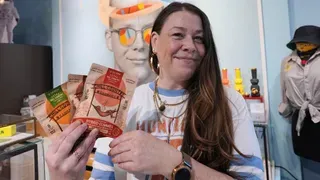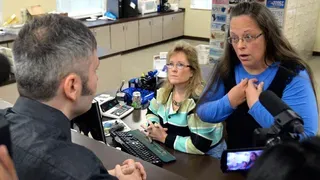March 10, 2010
Forced Out of the Closet: What Next? Ashburn Case Raises Question
Kilian Melloy READ TIME: 5 MIN.
The issue of "outing" anti-gay politicians who are gay themselves is a tough one, involving questions of privacy on one hand and charges of hypocrisy--even dishonesty--on the other. When a closeted gay politician advances his career by working to block or even rescind gay civil rights progress, should his constituents know about his or her true sexuality? What does it mean for a gay politician with an anti-gay voting record to say that he has simply been following the will of his constituents?
The events that led up to the outing of a California state senator have reawakened the debate, and stirred up new questions about what happens after an anti-gay pol emerges from the closet. After his arrest for drunk driving (reportedly after leaving a gay club, a male passenger in his car), and the public admission of what was evidently an open secret--his homosexuality--will Roy Ashburn be reviled? Will he become an advocate for GLBT causes? Will he fade into oblivion?
"For Ashburn, being part of the club of elected officials was more important than voting his conscience, and that's disturbing," a March 10 op-ed piece in California newspaper the Merced Sun-Star read. "Ashburn set himself up to be exposed, especially when he led a rally against same-sex marriage."
The op-ed added, "Times are changing, however. Most younger voters simply do not care about sexual orientation. Ashburn could have shown leadership by trying to change the minds of others. He never gave his constituents the chance."
Indeed, Ashburn was an opponent of marriage equality for gay and lesbian families, and though he did not campaign in support of Proposition 8, the ballot initiative that put the rights of gay families up to popular vote and cost those families their existing rights to enter into matrimony, he organized a religious rally years earlier, in 2005. The San Francisco Chronicle recalled on March 10 that Ashburn appeared next to anti-gay religious leaders to tell a crowd that, "Marriage between one man and one woman is fundamental to civilization."
The article also noted that many understood Ashburn's claim to be voting according to the will of the people who have voted him into office--people whose votes he would not have garnered, had they known that he was gay. Still, the issue of whether Ashburn's voting record, in light of his secret sexuality, represents a form of political integrity or whether it speaks to a cynical stripe of expedience.
This is not the first time an American politician has revealed to a stunned public that, appearances aside, he is gay. New Jersey's then-governor James McGreevey announced on Aug. 12, 2004, that, "My truth is that I am a gay American." Ashburn's confession had a similar ring to it when he admitted during a March 8 radio interview, "I am gay. Those are the words that had been so difficult for me for so long. But I am gay."
Being gay is a matter of core identity: something that political victory, or even political scandal, will not change. But what lies ahead for someone in Ashburn's position? Will the public forgive him? The San Francisco Chronicle's article reported on an ambivalence among Ashburn's constituents: they seemed more put out by his drunk driving than by what some have called his hypocrisy. At the same time, though, there was a straightforward admission on the part of several individuals cited in the article that a gay man would never have gotten their vote; one young man went so far as to admit point-blank, "[I'm] just prejudiced against gays. I'm just not comfortable with them."
Anger and Compassion
Conservative religious leader Chad Vegas, one of the anti-gay evangelicals who appeared with Ashburn during the 2005 anti-marriage rally, took a slightly different approach, parsing Ashburn's homosexuality to the point of denying it: "I don't think that Roy's gay," said Vegas. "I think he has homosexual inclinations... I actually think it's harmful to him."
Gay constituents also had mixed feelings--in their case, a blend of anger and compassion. "He had to vote 'no' 100 percent of the time to preserve his shield," said lesbian high school teacher Whitney Weddell. "And at the same time, he's legislating the homophobia he's so afraid of. It's a vicious circle." However, Weddell added, "In our community, one of the things we do is offer support in a time like this, and there was a part of me that wanted to reach out to him. But he has a lot of explaining to do."
Others in the GLBT community are liable to feel the same way. An Associated Content article by John Myers title "Coming Out Stories, March 2010," commented, "Ashburn joins an elite list of Republican hypocrites who've openly fought against gay rights, yet turned out to be 'Friends of Dorothy' deep within their own closets. The list includes: Representative Mark Foley, Ted Haggard (National Association of Evangelicals), Glenn Murphy Jr. (National Chairman of the Young Republicans), US Senator Larry Craig, and Bob Allen (member of Florida House of Representatives).
"The senator claims his voting record is based on the wishes of his constituents," the article continues. "I can only echo the thoughts of Geoff Kors, executive director of Equality California, a gay marriage advocacy group: 'It is unfortunate he helped spread the bigotry that forced him to stay in the closet. We hope he now takes this opportunity to educate people in his district and throughout the state that his sexual orientation is irrelevant.' "
Among his colleagues, however, Ashburn has received support from both sides of the aisle. Ashburn has become the first openly gay Republican state senator, noted the Monterey County Herald in a March 10 article, but that didn't seem to faze his peers: upon returning to the capital on March 8 after a few days' leave, Ashburn was greeted with "handshakes and backslaps from colleagues of both parties on the Senate floor."
Continued the article, " There's no doubt that his votes reflected his conservative district, which raises the perennial--and unanswerable--question of whether lawmakers should vote their personal consciences or their constituents' wishes, a question that goes way beyond gay rights.
"That aside, it's progress when a politician stops living a lie of any kind. It's better for the politician, as painful as it may be, and it's better for us. Perhaps Ashburn will inspire others to stop pretending."
Events seem to have inspired Ashburn to drop pretense, in any case; San Francisco Chronicle columnists Phillip Matier and Andrew Ross offered a glimpse at Ashburn's post-coming out life in a breezily written item that appeared in their March 10 column. "Newly out state Sen. Roy Ashburn appears to be very relaxed in his new life as a gay lawmaker," the item read. "The Bakersfield Republican was spotted Monday night at a popular capital eating place, Zoloco, in the company of a male friend. Both appeared to be comfortable and affectionate."
Kilian Melloy serves as EDGE Media Network's Associate Arts Editor and Staff Contributor. His professional memberships include the National Lesbian & Gay Journalists Association, the Boston Online Film Critics Association, The Gay and Lesbian Entertainment Critics Association, and the Boston Theater Critics Association's Elliot Norton Awards Committee.







